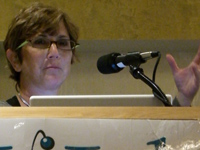“We’re a big fish in a small pond. Half of the news we get happens on the playground, in the parking lot. We get the story because we’re there.”
 Debbie Galant was a freelance columnist at The New York Times who lost her column and got inspired to think about hyperlocal journalism. From her home in Montclair, NJ, she and a partner launched the blog-styled Baristanet.com, doing “everything by the seat of our pants … covering three towns and 100,000 people.”
Debbie Galant was a freelance columnist at The New York Times who lost her column and got inspired to think about hyperlocal journalism. From her home in Montclair, NJ, she and a partner launched the blog-styled Baristanet.com, doing “everything by the seat of our pants … covering three towns and 100,000 people.”
“In the beginning it was just me. Now we have a few writers. We have more of the sensibility of The Daily Show. We’re not afraid to have opinions. We’re sort of columnists, sort of journalists, sort of bloggers. It’s fun, sassy, everything a weekly newspaper is not. We do a lot of silly polls. On April Fool’s Day, we publish fake stories and wait for people to get enraged before we let them in on the joke.”
In the early days, Baristanet gave away free ads just to show what they’d look like. Now the site attracts more advertising, especially from realtors. But it was spot news that gave Baristanet its first 1,000-visit day, when amateur photographers sent in pictures of a car fire downtown. Now, the site gets an average of 7,000 visitors a day.
Galant said Baristanet is “blowing away the competition.” There are plenty of weeklies and tons of shoppers distributed in the area, but when a micro burst (like a tornado) blew through her community on a Monday, Baristanet was out covering every angle of the story. “Even though the town lost power, people sent in pictures, and posted needs to a bulletin board. A pet store owner offered to refrigerate people’s medicines. People came to Baristanet to find out if the trains were running. The ‘competition’ – The Montclair Times – didn’t use its Web site at all since they were covering the story … for Thursday!”
A month later, when a manhole exploded on a main shopping street, only Baristanet was all over the story, with eyewitness reports and updates from both the major and fire chief. The power of immediacy – and citizen participation again – gave Baristanet a boost in traffic, during heat and snow emergencies, and even during community debates over whether to Astroturf a field, over a racist rap CD called “Porno Hate Train” being sold in the public school, over the local filming of the final episode of the HBO hit series “The Sopranos.”
Galant also shared a story of serendipity which reveals the magic of hyperlocal online citizen media: “We post announcements about lost dogs and cats all the time. This guy who owned a vacuum cleaner repair shop lost his dog three weeks earlier. He’s never been on the Internet. His brother tells him to go online and he Googles the words, ‘Bloomfield Sopranos’ and the first thing he sees is our site with a photo of his own lost dog!”
The site is without a doubt a big success, now grossing $100,000 a year with four part-time staff, and 63,000 unique visitors monthly.
“When you want to write an official letter to the editor, you go to your newspaper. But when you want to sound off or whistle-blow, you come to us.”
Calling their site the “gray lady of citizen journalism,” Lise LePage said she and her partner Christopher Grotke launched iBrattleboro.com back in 2003 to “provide the citizen’s perspective, “Our readers are our writers and they report about what they know, which is where they live.” Brattleboro is a town of 12,000 in Vermont. iBrattleboro has over 1,500 registered users and has published close to 7,500 stories.
The founding pair are Web developers who were concerned about media consolidation, the mainstream media’s support for the war in Iraq and the exclusion of dissident voices in that debate.
iBrattleboro has an innovative strategy to deepen its coverage of the community and get more readers involved as citizen reporter. The site has an assignment desk where visitors can sign up to cover meetings and events the editors consider newsworthy.
“We have tons of content of varying quality. We have a lot of one-liners, but the story develops through the comments. It’s extremely eccentric. It’s immediate, you can go to the site any time of day and you’ll see fresh content and see other people logged in, ” said LePage.
And the site encourages people to use their real names, so you can read the “unfiltered, unvarnished voices of real people you know in Brattleboro.” The police chief often posts on the site, as do various agency heads.
LePage and Grotke say they can measure their success off-line too. Attendance at community meetings is way up, in part because of announcements and discussions on iBrattleboro.com about controversial issues like development. And they’ve seen change. Pressure from citizen activists has led to changes in leadership at the business organization, the police department and the board of the public access TV station.
Does the local newspaper feel the competition? Grotke said, “We’ve heard anecdotally they feel we’re breathing down their neck. But I don’t think our $300 a month ad revenue is a threat. We are plankton. Citizens are saying that this is what we’re into. The newspaper should go out and cover it.”
“We’ve had almost no complaints about inaccurate information,” said LePage. “We trust our readers and writers and, almost all the time, they are accurate. Citizen journalism is always going to be advocacy. They attend a meeting because they have a reason for being there, but that doesn’t mean their coverage is going to be inaccurate.”
Touching the Community – Outside Traditional Media
- Jack Driscoll, Editor-in-Residence, MIT Media Lab
- Suzanne McBride, Co-editor, Creating Community Connections
- Keith Graham, Associate Professor, University of Montana School of Journalism
Filling in the Gaps – Emerging Competition
- Debbie Galant, Editor, Baristanet.com
- Lise LePage & Christopher Grotke, Editors, iBrattleboro.com
Twenty in Thirty – Twenty Good Ideas for Citizen Participation
- Jan Schaffer, J-Lab Executive Director
An Inside Look at the Strategy Behind LoudounExtra.com
- Rob Curley, Vice President for Product Development, Washingtonpost.Newsweek Interactive
AP’s “Now Public” Initiative
- Lou Ferrara, Deputy Managing Editor, Multimedia and Sports, Associated Press
Mainstream Media Goes Hyperlocal
- Olivia Garcia, Managing Editor, Bakersfield Californian’s Mercado Nuevo
- Steve Yelvington, Vice President of Strategy and Content, Morris Communications
- Kyle Leonard, Managing Editor, Chicago Tribune’s TribLocal.com
Lessons Learned – Backfence.com
- Mark Potts, Founder







